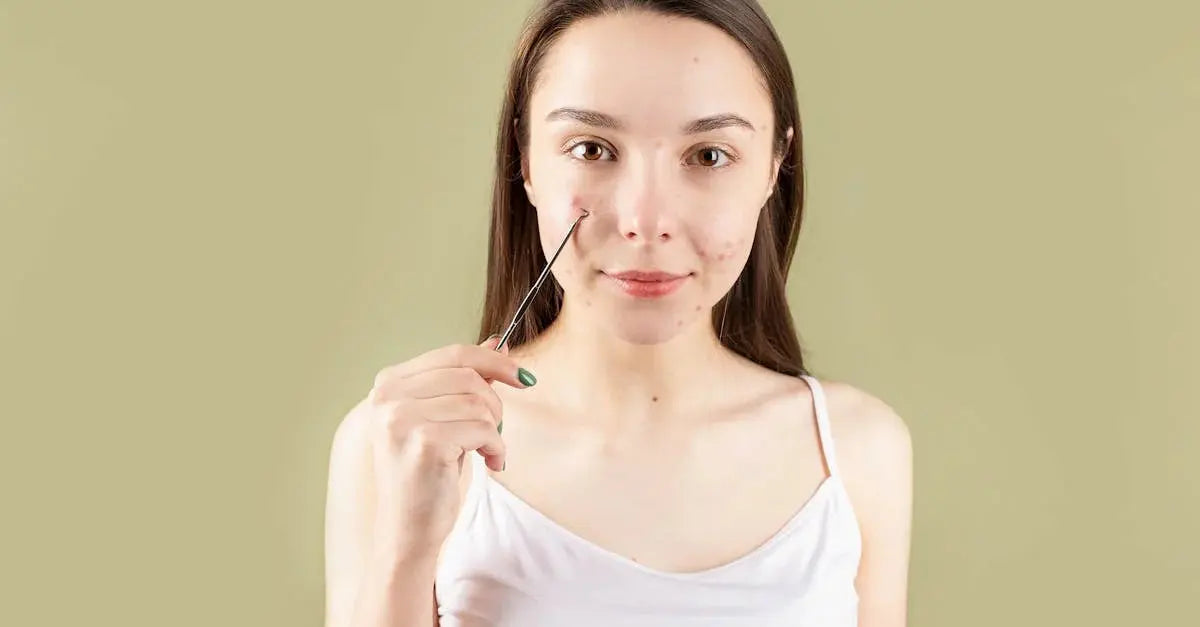
Top 6 Tips for Treating Hormonal Acne
Your Essential Guide to Hormonal Acne Treatment Solutions
Hormonal acne is influenced by hormonal fluctuations, diet, stress, and genetics. Effective treatments include topical retinoids, hormonal birth control, anti-androgens, and lifestyle changes such as a balanced diet, regular exercise, and stress management. A consistent skincare routine with gentle cleansers and non-comedogenic moisturizers is essential for managing this common skin condition.
Outline:
- Introduction to Hormonal Acne and Its Causes
- Understanding the Hormonal Changes Affecting Skin Health
- The Connection Between Hormones and Acne
- Top Treatments for Hormonal Acne
- Lifestyle Adjustments to Manage Hormonal Acne
- Creating a Skincare Routine for Hormonal Acne
- Expert Advice on Long-Term Hormonal Acne Management
- Conclusion: Embracing Effective Solutions for Hormonal Acne
Question:
What are the top 6 tips for treating hormonal acne?Answer:
Hormonal acne, caused by hormonal fluctuations, diet, stress, and genetics, can be managed by topical retinoids, hormonal birth control, anti-androgens, and lifestyle changes. These changes include a balanced diet, exercise, stress management, and a consistent skincare routine.Introduction to Hormonal Acne and Its Causes
Hormonal acne is a common skin condition that affects people of all ages, but it's particularly common during puberty and menopause. Understanding and treating hormonal acne is essential for maintaining clear and healthy skin. But what exactly is hormonal acne, and why does it occur?
Hormonal changes can wreak havoc on your skin, leading to breakouts. These changes can be triggered by various factors including stress, diet, and genetics. According to the Ultimate Dermatologist Guide on Hormonal Acne, hormonal acne often appears on the lower face, such as the jawline and chin.
So, what causes these pesky pimples? Here are some common triggers:
- Hormonal Fluctuations: During puberty, menstruation, pregnancy, or menopause, hormone levels can shift dramatically, causing an increase in oil production.
- Diet: Foods high in sugar and dairy can spike insulin levels, which in turn can lead to acne.
- Stress: Stress triggers the release of cortisol, which can cause your skin to produce more oil.
- Genetics: If your parents had acne, chances are you might struggle with it too.
"Hormonal acne looks like regular acne, except it's quite a bit more stubborn," explains Jeanine Downie, MD, in an article on Hormonal Acne 101: Everything to Know, According to Skin Experts. The overproduction of sebum clogs pores, leading to inflammation and acne.
Understanding and treating hormonal acne involves recognizing these triggers and implementing effective solutions. In the next sections, we'll delve deeper into how hormonal changes impact your skin and offer practical treatments and lifestyle adjustments to help you achieve clearer skin.
Understanding the Hormonal Changes Affecting Skin Health
Hormones are like tiny messengers in our bodies, controlling many different functions, including our skin's health. When these messengers go out of balance, it can lead to hormonal acne, a common problem that affects many people. Understanding and Treating Hormonal Acne is essential for anyone looking to improve their skin health.
So, how do hormonal changes affect our skin? Let's break it down:
- Puberty: This is often the first time people experience hormonal acne. During puberty, the body produces more androgens, which can increase oil production and lead to clogged pores.
- Menstrual Cycle: Many women notice their skin breaking out right before their period. This is due to fluctuations in estrogen and progesterone levels.
- Pregnancy: Hormonal changes during pregnancy can also cause acne. The body produces more hormones to support the growing baby, which can sometimes lead to skin issues.
- Menopause: As women age and go through menopause, estrogen levels drop, which can lead to drier skin and sometimes acne.
Dr. Erika Schwartz, in her article The Impact of Hormonal Changes on Women's Skin Health: Understanding and Treatment, explains that hormones regulate vital skin functions like collagen production and hydration. When these hormones are out of balance, it can lead to various skin problems, including acne.
"Hormonal fluctuations are like a roller coaster for your skin," says Dr. Schwartz. "Understanding how these changes affect your skin can help you take better care of it."
To manage hormonal acne effectively, it's crucial to understand these changes and how they impact your skin. This knowledge can guide you in choosing the right treatments and making lifestyle adjustments that support healthier skin. Whether it's through skincare products, diet, or stress management, there are many ways to keep your skin looking its best despite hormonal ups and downs.
The Connection Between Hormones and Acne
Hormones play a huge role in how our skin behaves, especially when it comes to acne. Hormonal acne occurs when fluctuations in hormones lead to an increase in oil production, which can clog pores and cause breakouts. This type of acne is especially common during puberty, menstrual cycles, pregnancy, and even menopause.
Understanding and Treating Hormonal Acne Provide a guide on how hormonal changes affect skin health, particularly focusing on acne, and offer advice on treatments and lifestyle adjustments. Hormones like androgens, which include testosterone, are often the main culprits. When these hormones surge, the skin's oil glands produce more sebum, leading to more acne.
According to the article Hormonal Acne: Understanding the Connection between Hormones and Skin, the hormonal surges of puberty and the cyclical changes of the menstrual cycle are key times when acne can worsen. This makes understanding hormonal acne and its triggers crucial for effective treatment.
Here are some key points to remember about the connection between hormones and acne:
- Androgens: These hormones, including testosterone, increase during puberty and lead to more oil production.
- Menstrual Cycle: Hormonal fluctuations before and during menstruation can trigger acne breakouts.
- Pregnancy: Hormonal changes during pregnancy can improve or worsen acne.
- Menopause: Declining estrogen levels can lead to an increase in acne.
Quotes from dermatologists often emphasize the importance of recognizing these hormonal influences. For instance, Dr. Peredo mentions, "Understanding the role of hormones is essential in managing acne effectively."
By recognizing the hormonal factors at play, you can better manage and treat hormonal acne. Understanding and treating hormonal acne involves not just skincare products but also lifestyle changes that support hormonal balance. So, keep an eye on those hormone levels and make adjustments as needed!
Top Treatments for Hormonal Acne
Hormonal acne can be a tough nut to crack, but don't worry, there are effective treatments out there! Understanding and Treating Hormonal Acne is key to finding the right solutions for you. Here are the top 6 tips for treating hormonal acne.
- Topical Retinoids
Topical retinoids are often the first line of defense. They help unclog pores and reduce inflammation. According to the SELF guide on hormonal acne, these treatments are particularly effective for mild to moderate cases.
- Hormonal Birth Control
Hormonal birth control can help regulate the hormones that cause acne. Pills containing both estrogen and progesterone are often recommended. This method can take a few months to show results, but it’s worth the wait!
- Anti-Androgens
Medications like spironolactone can block androgens, the hormones that cause oily skin and acne. This treatment is particularly useful for women and offers a targeted approach to managing hormonal acne.
- Topical Antibiotics
Using topical antibiotics can help reduce bacteria and inflammation on the skin. Combining this treatment with others often yields the best results. The GoodRx guide suggests consulting a dermatologist to create a personalized plan.
- Dietary Changes
Believe it or not, what you eat can affect your skin. Reducing dairy and high-glycemic foods may help manage hormonal acne. Keeping a food diary can help you identify triggers.
- Skincare Routine
A consistent skincare routine is essential. Use gentle cleansers and non-comedogenic moisturizers. Products containing salicylic acid or benzoyl peroxide can be especially helpful.
"Combining different treatments usually works best," notes the GoodRx guide. So, consult your primary care provider or dermatologist to come up with the best plan for you. With the right treatment and some lifestyle adjustments, you can manage hormonal acne effectively.
Lifestyle Adjustments to Manage Hormonal Acne
When it comes to Understanding and Treating Hormonal Acne, making a few lifestyle changes can make a world of difference. Here are the top tips to help manage hormonal acne effectively:
-
Prioritize Sleep: According to holistic nutritionist Kimberly Snyder, making sleep a priority is key. "Sleep fights stress and helps your body and hormonal systems function," she says. Aim for 7-9 hours of sleep per night.
-
Stay Hydrated: Drinking plenty of water is essential for maintaining healthy skin. Keep a water bottle with you and aim to drink at least 8 glasses of water a day.
-
Exercise Regularly: Physical activity helps reduce stress and balance hormones. Activities like yoga, walking, or even dancing can be beneficial. As Snyder recommends, "Exercising, especially yoga, helps manage and relieve stress."
-
Maintain a Balanced Diet: Eating a diet rich in fruits, vegetables, and whole grains can help regulate hormones. Avoid processed foods and sugary snacks as they can trigger acne flare-ups.
-
Manage Stress: High levels of stress can disrupt your hormonal balance. Incorporate relaxation techniques like meditation, deep breathing, or hobbies that you enjoy.
-
Support Gut Health: A healthy gut can lead to healthier skin. Consider probiotics and fiber-rich foods to maintain a balanced gut microbiome.
By incorporating these lifestyle adjustments, you can better manage hormonal acne and improve your overall skin health. For more detailed insights, check out the Ultimate Dermatologist Guide on Hormonal Acne.
Creating a Skincare Routine for Hormonal Acne
Dealing with hormonal acne can feel like an uphill battle, but with the right skincare routine, you can make strides towards clearer skin. Understanding and treating hormonal acne involves a tailored approach that considers your skin's unique needs. Here’s how you can create an effective skincare routine for hormonal acne.
1. Gentle Cleansing
Start your day with a gentle cleanser to remove excess oil and impurities. Look for products with salicylic acid or benzoyl peroxide. These ingredients help to unclog pores and reduce inflammation.
2. Applying Acne Treatments
After cleansing, apply a targeted acne treatment. Products containing salicylic acid, benzoyl peroxide, or retinoids are highly effective. Dermatologists often recommend retinoids for their ability to speed up skin cell turnover, which can help clear up acne faster. For more insights, check out the Best Skincare Routine for Acne 2024 by Cosmopolitan.
3. Hydrate Wisely
Hydration is key, even for acne-prone skin. Opt for oil-free, non-comedogenic moisturizers that won't clog pores. Products like Neutrogena's Hydro Boost Gel-Cream are great for providing necessary moisture without causing breakouts.
4. Sun Protection
Sunscreen is a must. Choose a broad-spectrum sunscreen with at least SPF 30. This protects your skin from harmful UV rays and prevents acne scars from darkening.
5. Night Care Routine
At night, repeat your cleansing routine and apply a stronger acne treatment. Nighttime is ideal for using retinoids, as they can make your skin more sensitive to sunlight. Follow up with a lightweight moisturizer.
6. Regular Exfoliation
Exfoliating once or twice a week can help to remove dead skin cells and prevent clogged pores. However, be gentle. Over-exfoliation can irritate the skin and worsen acne.
Lifestyle Adjustments
Besides your skincare routine, lifestyle changes play a significant role in managing hormonal acne. Maintaining a balanced diet, staying hydrated, and managing stress can all contribute to healthier skin.
Creating a skincare routine for hormonal acne is about consistency and using the right products. Remember, everyone's skin is different, so it may take some time to find what works best for you. Stay patient and positive – clearer skin is within reach!
Expert Advice on Long-Term Hormonal Acne Management
Understanding and treating hormonal acne can be a journey, but with the right strategies, long-term management is achievable. Hormonal acne often resurfaces due to the internal imbalances in our body's hormones. Here are some expert tips to help you keep your skin clear over the long haul.
-
Consistent Skincare Routine: Maintaining a daily skincare routine is crucial. Use gentle cleansers, non-comedogenic moisturizers, and products containing benzoyl peroxide or salicylic acid. As Dr. Katie Rodan mentions in 11 Ways to Treat Hormonal Acne, According to Dermatologists, "Benzoyl peroxide is excellent for killing bacteria and clearing pores."
-
Healthy Diet Choices: What you eat can significantly impact your skin. Aim to consume a balanced diet rich in fruits, vegetables, and whole grains. Avoid high-glycemic foods and dairy, which can trigger acne flare-ups.
-
Stress Management: Stress can exacerbate hormonal imbalances. Practices like yoga, meditation, and regular exercise can help keep stress levels in check.
-
Regular Check-ups: Consult with a dermatologist regularly to monitor your skin's progress and adjust treatments as needed. They can provide tailored advice based on the latest research, like those found in the Ultimate Dermatologist Guide on Hormonal Acne.
-
Hormonal Treatments: Sometimes, managing hormonal acne requires medical intervention. Birth control pills, anti-androgens, or other hormonal therapies can be effective. Discuss these options with your healthcare provider.
-
Patience and Persistence: Treating hormonal acne is not an overnight fix. It requires patience, persistence, and a positive mindset. Remember, every step you take brings you closer to clear skin.
"Understanding and treating hormonal acne provide a guide on how hormonal changes affect skin health," says Dr. Jeanine Downie in Hormonal Acne 101: Everything to Know, According to Skin Experts.
By following these expert tips, you can manage your hormonal acne effectively and enjoy healthier, clearer skin over the long term.
Conclusion: Embracing Effective Solutions for Hormonal Acne
Hormonal acne can be a stubborn foe, but understanding and treating hormonal acne is within your reach. By recognizing how hormonal changes affect skin health, particularly focusing on acne, you can take proactive steps to manage this common issue. Throughout this guide, we've explored the connection between hormones and acne, delved into effective treatments, and suggested lifestyle adjustments to help you achieve clearer skin.
Here are the key takeaways:
-
Identify Hormonal Imbalances: Understanding and treating hormonal acne starts with recognizing the signs. Hormonal changes can lead to acne, and knowing the triggers can help you manage outbreaks.
-
Topical Treatments: Use products with ingredients like benzoyl peroxide and retinoids. These can be very effective in reducing acne. According to the 11 Ways to Treat Hormonal Acne, According to Dermatologists, benzoyl peroxide is a top choice.
-
Hormonal Therapies: Consider options like oral contraceptives and anti-androgens. These treatments target the hormonal roots of acne and can be very effective.
-
Diet and Lifestyle: Eating a balanced diet rich in fruits, vegetables, and lean proteins can improve skin health. Managing stress is also crucial as chronic stress can exacerbate hormonal imbalances and acne.
-
Consistent Skincare Routine: Adopting a skincare routine tailored to hormonal acne can make a huge difference. Cleanse your skin gently and use products designed to treat and prevent acne.
-
Expert Advice: Don't hesitate to seek advice from dermatologists. They can provide personalized treatment plans that address your specific needs.
As you move forward in your journey to clearer skin, remember that patience and consistency are key. Embrace the solutions that work best for you and make them a part of your daily routine. With the right approach, managing hormonal acne is possible, and you can enjoy the confidence that comes with healthy, glowing skin.
At Arwin-Biotech, we understand the complexities of skin health, especially when it comes to hormonal changes that can result in acne. Our science-centric skincare products, designed for all genders and ages, address a variety of skin issues such as oily skin, acne-prone areas, and uneven skin tones. By offering a comprehensive range of products like 'Age Defying', 'Brightening & Anti-spot', and 'Oily Skin & Skin renewal', we ensure that everyone can find their perfect skincare routine. Our mission is to empower individuals with the knowledge and tools they need to achieve healthier skin. For a detailed guide on how hormonal changes affect your skin and tips for effective treatments and lifestyle adjustments, visit our page on Understanding and Treating Hormonal Acne. Arwin is committed to providing a sense of care and warmth to our customers, ensuring that your skincare journey is both effective and enjoyable. Explore our offerings and see why we are a leading name in luxury skincare, driven by innovation and inclusivity.



